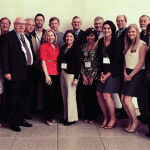
After nearly two years of discussion, on November 10, 2012, the ACR Research and Education Foundation (REF) debuted its new name and tagline, “The Rheumatology Research Foundation: Advancing treatment. Finding cures.” The announcement is part of an overall branding strategy for the ever-growing fundraising branch of the ACR that better defines its mission and goals.
Naming Conventions
The Foundation’s mission is to advance research and training to improve the health of people with rheumatic diseases. It also provides significant support to the training and development of young rheumatologists and academic investigators. While the gist of this mission hasn’t changed, it has expanded over the years. The new name and tagline were chosen deliberately to communicate the broadened vision to physicians, patients, and the general public to help bolster fundraising activities and, in turn, support disease-targeted research through the core awards program. The goal for the next four years is to raise $60 million.
“The Foundation has been growing substantially, and in recent years we really have pushed ourselves in terms of the range of issues that we’re addressing,” says David Daikh, MD, PhD, Foundation president (2011–2013); associate professor of medicine and director of the rheumatology fellowship training program at the University of California, San Francisco; and chief of the arthritis section at the San Francisco VA Medical Center. “We recognize there is great need in terms of training rheumatologists to care for people with rheumatic disease and great need in terms of learning more about the causes and optimal treatment of rheumatic disease. Since the Foundation has been stepping up to meet these needs, we felt this was an important time to look at our brand and make sure we were getting our message out in an understandable way.”
One important thing to understand is that education and training remain a priority for the Foundation. Removing “education” from the name was done for the sake of clarity.
“The intent is not to underemphasize education but to clarify the mission of the Foundation,” says William J. Arnold, MD, member at large (2010–2013) and a rheumatologist at Illinois Bone and Joint Institute LLC in Morton Grove, Ill. “We are the ACR. The research foundation is the single largest nonprofit supporter of rheumatology education in the country outside of the government. It’s the largest private source of funds to support rheumatology education, and that’s going to be the same going into the future, if not more.”
Research and Training Goals
The Foundation promotes its mission through a number of annual awards. Since 1985, the Foundation has given more than 2,000 awards and grants to medical and graduate students, residents, fellows, physicians, and health professionals, representing a total commitment of nearly $100 million. Additionally, the National Institutes of Health (NIH) has given nearly $110 million to Foundation grantees who have previously received a career development–type award.
In fiscal year 2013, the Foundation is funding the most awards in its history, to the tune of $12.3 million. This includes more than $6 million to education and training awards and career development awards, as well as $6.3 million to the disease-targeted grants initiative, which includes $2 million to the new clinical trial grants.
The disease-targeted research initiative is a key aspect of advancing treatment and finding cures, Dr. Daikh explains. The initiative began with the Within Our Reach: Finding a Cure for Rheumatoid Arthritis (RA) campaign, the Foundation’s first disease-targeted research initiative.
Gregg J. Silverman, MD, professor of medicine and pathology and codirector of the Musculoskeletal Center of Excellence at NYU School of Medicine in New York City, member-at-large (2009–2012), and Foundation clinical trials peer reviewer, says the proposals submitted for the clinical trials program were “absolutely remarkable” and he was impressed with the questions the researchers posed. “This really is one of the most informative and exciting reviews that I’d ever been involved in,” he says. “People opened up their perspectives on what could really be important to help influence clinical decision making in the rheumatologist’s office.”
The most recent campaign, Journey to Cure, will help address the ongoing need for research into the causes of RA and other forms of inflammatory arthritis and to develop more effective treatments for these conditions. The thought for expanding beyond RA, Dr. Daikh says, is to address additional areas of need while sustaining the momentum in RA research that has been generated so far. At the same time, through new fundraising for the Foundation’s core training awards, the Journey to Cure campaign will also address the critical need for new junior investigators to sustain rheumatology programs across the country and for new clinical rheumatologists to meet the growing workforce issues in rheumatology.
The Journey to Cure program has already been met with great enthusiasm from donors, and progress toward initial goals is ahead of schedule, Dr. Silverman says. “That suggests that there are many like-minded and sympathetic people in our community who not only agree with the Foundation’s vision but believe that we should be moving even faster,” he continues. “There has been a groundswell of support….We see that the impact of our programs, and the deepening of our partnership with the ACR, will have broad benefits for the care of our patients and for the practice of rheumatology in the future.”
Getting Involved
Support for the Foundation’s mission can be found not only among practicing rheumatologists, but from the patients they serve. Garnering support doesn’t have to be uncomfortable, Dr. Arnold says, noting that rheumatologists and the patients in their offices are key for moving the mission forward.
“Many physicians feel very uncomfortable asking patients for money,” Dr. Arnold says. “Physicians don’t have to do that. What rheumatologists should do is ask their patients, ‘Would you be interested in hearing about this? Our foundation is doing research directly applicable to your illness.’ If the patient says yes, the connection needs to be made with the professionals who are staffing the Foundation, and they’ll take it from there.” [Editor’s note: Health professionals and patients interested in learning more about the Foundation can call (404) 633-3777 or e-mail [email protected].]
Physicians also can place informational flyers or posters in their practice settings to help start the conversation. In addition, the Foundation is always in need of volunteers for various projects, programs, or committees. Any form of involvement can help advance rheumatology research and training, and therefore help patients.
“This foundation has been very successful and will continue to be successful if the rheumatology community unites behind it,” Dr. Arnold says. “The purpose and the goals of the Foundation are perfectly aligned with what the rheumatologists want to accomplish for our patients: advancing treatment and finding cures. It couldn’t be a more specific alignment, and that is definitely worthy of our support.”
What’s in Store
The Rheumatology Research Foundation will continue to play an important role in shaping the future of rheumatology. Not only will the research initiatives assist in improving treatment for patients, but by supporting budding rheumatologists and investigators, the Foundation can help bolster the rheumatology workforce of the future and fill training programs with academic rheumatologists.
“We really feel that we’re in this for the long term,” Dr. Daikh says. “For the future, we hope to continue to grow to be able to support the priorities of rheumatologists as members of the ACR and to meet the needs of the greater public from the standpoint of rheumatic disease. We hope that with a clearly defined brand and new name, we will become more recognized and more understandable to more and more people.”
Kimberly J. Retzlaff is a medical journalist based in Denver.


